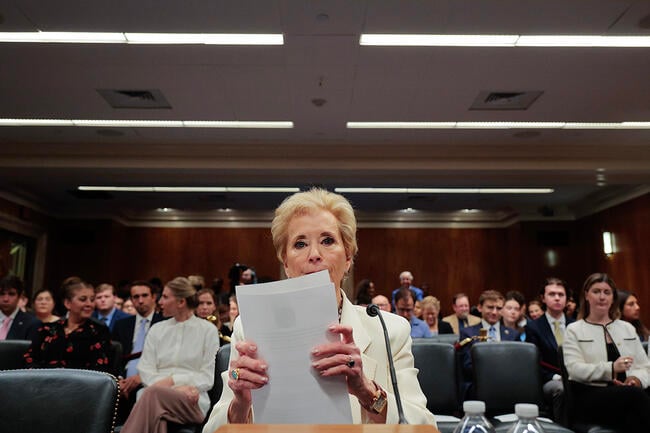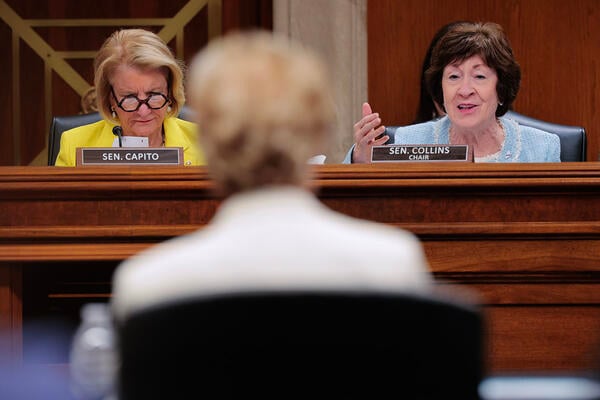You have /5 articles left.
Sign up for a free account or log in.

Secretary of Education Linda McMahon testified before a Senate appropriations subcommittee hearing Tuesday.
Chip Somodevilla/Getty Images
Secretary of Education Linda McMahon defended major spending cuts to indignant Democrats and skeptical Republicans at a Senate budget hearing Tuesday.
It was the second of three appearances McMahon is making on Capitol Hill in quick succession: In late May, McMahon defended the cuts at a House appropriations committee hearing, and later today she will speak before the House Education and Workforce Committee.
The hearings were essentially about the White House’s proposed budget, which would slash education spending by 15 percent, including unprecedented funding declines for Pell Grants and research. But McMahon also addressed concerns about major cuts to the Education Department already implemented this spring, including laying off half the department’s staff, and about the department’s role in the Trump administration’s campaign to exert dominance over universities like Harvard and Columbia.
McMahon made a few striking comments during Tuesday’s Senate hearing, including that universities under federal scrutiny, like Harvard and Columbia, should do a better job “vetting” applicants and faculty hires to weed out those who hold views the administration considers unsavory. She also admitted that the department had not conducted any analysis on the effects of its massive reduction in force before laying off half its staff in March, shedding more light on a murky process that McMahon told House lawmakers last month had been largely the work of the Department of Government Efficiency.
Later, after Sen. Chris Murphy, a Connecticut Democrat, repeatedly asked her to cite the statute that allows the government to withdraw funding from universities over disagreements on viewpoint diversity, McMahon offered a surprising answer.
“Title VI,” she said, referring to the civil rights law from 1964 that bars racial discrimination.
“These were civil rights violations. That is why we filed a case and stopped the funding for Harvard as well as Columbia,” McMahon continued. “And in conversations with [the universities], we talked about different things that they should do coming back to the table.”
Murphy responded that civil rights law does not grant “the authority to micromanage viewpoint diversity on campus.”
Democratic senators grew increasingly indignant, asking McMahon for more clarity on what they said were hypocritical positions: that the budget cuts were necessary to reduce an intrusive and expensive federal bureaucracy, and also that the government should also have a heavier hand in institutions’ governance, curricula and culture.
“You claim the administration’s goal of eliminating the department is about returning education to the states,” said Sen. Tammy Baldwin, a Wisconsin Democrat and ranking member of the subcommittee. “At the same time, this administration is attempting to exert more control than ever over decisions in our schools and campuses.”
Democrats weren’t the only lawmakers with tough questions for McMahon. While she was largely praised by Republicans in the House last month, her compatriots in the Senate were more skeptical of the unprecedented spending cuts and bureaucratic overhaul she is overseeing at the department. The opposition could signal that Congress won’t include some of the more unpopular proposed cuts in the fiscal year 2026 budget.
Sen. Shelley Moore Capito, a West Virginia Republican, questioned the wisdom of gutting the Office for Civil Rights when the department is also investigating claims of antisemitism and discrimination against white men on campuses. Nearly half of the OCR’s staff were let go in the March reduction in force, hobbling its capacity to address complaints and exacerbating a massive backlog. The proposed budget would cut OCR’s budget by $49 million, or 35 percent.
“Your budget proposes to decrease the Office of [sic] Civil Rights,” she said. “How are you going to make sure all students, and in this case Jewish students, can learn in an environment free from intimidation?”
McMahon said the department was cracking down on antisemitism by investigating and cutting funding to institutions it sees as the biggest perpetrators, namely Harvard and Columbia. Capito seemed unimpressed with that reply.
“I agree with the substance of what you’re saying, but you’re one person,” she said. “You need the support and the backup of that office to be able to investigate these cases.”

Chip Somodevilla/Getty Images
Likewise, the White House’s plan to eliminate the college-access initiatives TRIO and GEAR UP raised concerns among Republican senators who champion the program, including Capito and Susan Collins of Maine, who chairs the powerful appropriations committee.
Collins, who wore a TRIO pin to the hearing, said she “strongly disagrees” with Trump’s proposed cuts.
“I have seen the lives of countless first-generation and low-income students, not only in Maine, but across the country, who often face barriers to accessing a college education, changed by the TRIO program,” Collins said. “Three of my own staff members went through the program and told me that they would not have pursued higher education but for the support and confidence that they gained from it.”
McMahon suggested that, should Congress fund the TRIO and GEAR UP programs against the White House’s suggestions, they should institute an audit process and strict accountability measures.
“If you decide with appropriations to continue these programs, we could work with you to renegotiate those terms that we feel hamstrung the Department of Education,” McMahon said. “We want to make sure that anything that we are funding, we can attach accountabilities to it.”
More funding discretion for the Trump administration could mean more weapons to use against institutions that do not comply with its sweeping higher education agenda, especially the anti-DEI executive orders. The administration could use an audit to pull TRIO funds for programs that focus on precollege outreach to racial minorities or first-generation students—efforts that colleges have been pulling back from in recent months.
Sen. John Kennedy of Louisiana was the lone Republican to defend the TRIO cuts, saying the lack of accountability for how universities spend the funds makes it irresponsible. He also claimed that the federal government has spent more than $1 trillion on the program over the past decade; the real total is around $12 billion.
Throughout the hearing, McMahon denied seeking to eliminate many of the programs the budget defunds, instead saying they should be handed over to state and local policymakers. But the House recently passed legislation cutting Medicaid and other core federal assistance programs, which would strain on state budgets and likely lead to significant education spending cuts at the state level as well.
“The cut to these programs is profound and the states are not going to step up and say, ‘We can do this,’” said Rhode Island senator Jack Reed, a Democrat. “If this budget passes, every state in the country is going to make a difficult decision: Do I save my health-care system or do I save my public education system? Many of them can’t do both.”





